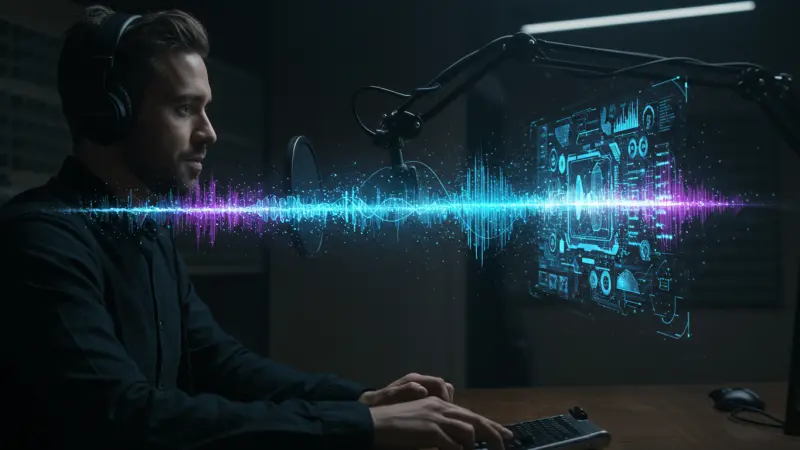The Future of Podcasting: Using AI Voice Generators for Perfect Audio

The Quest for Perfect Audio: A Podcaster's Dilemma
For every podcaster, from the bedroom hobbyist to the seasoned professional, the pursuit of perfect audio is a relentless journey. It’s a battle against background noise, awkward pauses, verbal stumbles, and the sheer time and expense of recording and editing. Hours are spent re-recording lines, painstakingly editing out 'ums' and 'ahs,' and investing in expensive microphones and soundproofing, all in the name of delivering a crisp, professional listening experience. But what if there was a way to bypass these hurdles entirely? What if you could generate flawless, broadcast-quality audio from a simple text script in minutes? Welcome to the future of podcasting, a future powered by Artificial Intelligence.
AI voice generators are no longer the robotic, monotone relics of the past. Today's technology offers astonishingly realistic, emotionally expressive, and customizable synthetic voices that are poised to revolutionize the audio landscape. This isn't about replacing human creativity; it's about augmenting it, providing podcasters with powerful new tools to create better content, faster and more efficiently than ever before.
What Exactly is an AI Voice Generator?
At its core, an AI voice generator is a sophisticated software that uses artificial intelligence to convert written text into audible speech. This technology, often called Text-to-Speech (TTS), has evolved dramatically. Modern systems leverage deep learning and neural networks to analyze vast datasets of human speech, learning the nuances of intonation, pacing, emphasis, and emotion. The result is audio that is often indistinguishable from a human speaker.
The technology generally falls into two main categories:
- Text-to-Speech (TTS): You provide a script, and the AI generates the audio using a pre-built library of high-quality synthetic voices. You can often choose from various accents, genders, and speaking styles (e.g., newscaster, conversational, storyteller).
- Voice Cloning: This is a more advanced application where the AI is trained on a specific person's voice. By providing a short sample of your own speech, the AI can create a digital replica—a "voice clone"—that can then speak any text you provide, perfectly mimicking your unique tone and cadence.
Both technologies open up a universe of possibilities for podcasters looking to streamline their workflow and elevate their production quality.
The Revolution: How AI is Reshaping the Podcasting Workflow
The impact of AI voice generators on podcasting is not just incremental; it's transformative. Here’s how this technology is fundamentally changing the way audio content is created.
Flawless Audio, Every Single Time
Imagine a recording session with no mistakes. No stumbles over complex names, no fumbled lines, no distracting mouth clicks or breath sounds. With an AI voice generator, your script is the source of truth. The generated audio is perfectly paced, clearly articulated, and completely free of human error and background noise. This eliminates the most tedious part of post-production: the micro-editing of mistakes. You get a clean, professional take on the first try, every time.
Unprecedented Speed and Efficiency
Consider the traditional podcasting process: scripting, scheduling, recording, editing, mixing, and mastering. The recording and editing phases can consume dozens of hours for a single episode. AI voice generators compress this timeline dramatically. Once your script is finalized, you can generate the entire audio track in minutes. Need to update a statistic or correct a fact after publishing? No need to re-record. Simply edit the text and regenerate the audio file. This agility is a game-changer for time-sensitive content like news or current events podcasts.
Voice Cloning: Your Digital Vocal Double
Voice cloning is perhaps the most powerful AI tool for established podcasters. By creating a digital clone of your voice, you unlock incredible flexibility:
- Effortless Corrections: Did you misspeak or discover a factual error after recording? Instead of setting up your microphone and trying to match the original tone and energy, you can simply type the corrected sentence and have your AI voice clone say it for you, seamlessly splicing it into the original recording.
- Content Creation Without You: Imagine you're on vacation or have lost your voice, but your weekly episode is due. You can write the script and have your voice clone narrate the entire episode, maintaining consistency for your audience.
- Standardized Segments: Use your voice clone for recurring segments like intros, outros, and ad reads. This ensures perfect consistency in tone and quality across all your episodes.
Breaking Down Language Barriers
The global potential for podcasts is massive, but language is a significant barrier. AI voice generators are breaking it down. Advanced platforms can not only translate your script into dozens of languages but also generate the audio in a native-sounding voice for each language. This allows you to reach a truly international audience without the prohibitive cost and logistical complexity of hiring multiple voice actors.
Repurposing Content at Scale
Every great blog post, article, or newsletter you've written is a potential podcast episode. Manually converting this written content into audio is time-consuming. With AI, it's a matter of copy-and-paste. You can instantly create an audio version of your best-performing articles, expanding your reach to audiences who prefer to listen on their commute, at the gym, or while doing chores.
Choosing the Right AI Voice Generator for Your Podcast
The market for AI voice tools is expanding rapidly. When evaluating options for your podcast, look beyond just the voice quality and consider these key features:
- Voice Realism and Emotional Range: Listen to samples. Does the voice sound natural? Can it convey different emotions like excitement, seriousness, or empathy? The best tools offer controls for pitch, speed, and emphasis.
- Voice Library and Accents: A diverse library of high-quality voices and accents gives you the flexibility to find the perfect narrator for your content or to create distinct characters for narrative podcasts.
- Voice Cloning Capabilities: If maintaining your personal brand is important, prioritize tools that offer high-fidelity voice cloning with a minimal amount of training data required.
- Custom Pronunciation: Your podcast might include specific jargon, brand names, or acronyms. A good AI tool will allow you to build a custom dictionary to ensure these words are always pronounced correctly.
- Ease of Use: The user interface should be intuitive, allowing you to easily input text, preview audio, make adjustments, and export files in common formats like MP3 or WAV.
- API Access: For larger operations or those looking to build custom workflows, API access allows you to integrate the voice generation capabilities directly into your own content management systems.
Explore Hundreds of AI Tools
Ready to find the perfect tool for your needs? Browse our complete, filterable directory of the best AI software on the market.
Browse the DirectoryThe Ethical Considerations: Authenticity and Transparency
With great power comes great responsibility. The rise of synthetic media necessitates a conversation about ethics and transparency. While AI voices offer incredible benefits, it's crucial to use them responsibly.
The primary principle should be transparency. If a significant portion or the entirety of your podcast is AI-generated, it's good practice to inform your audience. A simple note in the show description or a brief mention in the audio itself builds trust and prevents listeners from feeling deceived. This is especially critical when using a voice clone. You wouldn't want someone else creating content in your voice without permission, and your audience deserves to know when they are hearing you versus your digital replica.
Authenticity isn't just about whether a voice is human or AI; it's about the quality and value of the content. An AI-voiced podcast that is well-researched, insightful, and engaging is far more 'authentic' than a human-hosted show that is poorly produced and offers little substance.
Your First AI-Powered Episode: A 5-Step Guide
Ready to experiment with AI in your podcast? Here’s a simple roadmap to get started.
- Define Your Goal: What do you want to achieve? Are you creating an audio version of a blog post, producing a new show from scratch, or simply creating a professional intro/outro for your existing podcast? Your goal will determine the best tool and approach.
- Write a Killer Script: AI can't fix a bad script. Write for the ear, not the eye. Use shorter sentences, conversational language, and clear punctuation, as this will guide the AI's pacing and intonation. Read it aloud to catch awkward phrasing.
- Select Your Tool and Voice: Based on your needs and budget, choose an AI voice generator. Spend time exploring its voice library to find one that matches your brand's tone. If you're cloning your voice, follow the platform's instructions carefully for the best results.
- Generate and Refine: Paste your script into the tool. Listen to the generated audio carefully. Most platforms allow you to adjust pronunciation, add pauses, and change the emphasis on specific words. Tweak until it sounds perfect.
- Integrate and Publish: Export the final audio file. You can now use this as your full episode or edit it into your existing recording in your Digital Audio Workstation (DAW) like Audacity or Adobe Audition. Add your theme music, mix the levels, and publish it to the world!
Conclusion: The Sound of the Future
AI voice generators are not a fleeting trend; they represent a fundamental shift in digital content creation. For podcasters, this technology democratizes high-end production, breaks down creative barriers, and opens up new avenues for growth and efficiency. By embracing AI, you can eliminate technical headaches and focus on what truly matters: crafting compelling stories and delivering immense value to your listeners.
The future of podcasting isn't about human versus machine. It's about human and machine working together to create experiences that are more immersive, accessible, and impactful than ever before. The tools are here, the quality is stunning, and the potential is limitless. It's time to start listening to the sound of the future.
About Paul Peery
Founder of Best AI Powered

